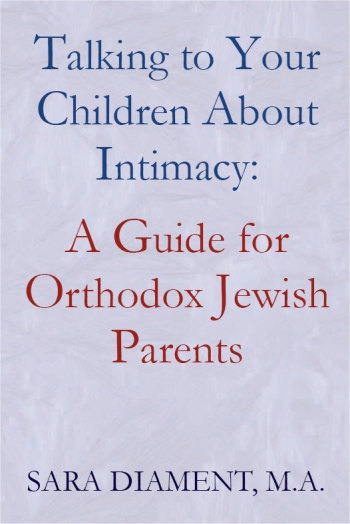Two books parents should know about: "Talking to your children about Intimacy: a guide for Orthodox Jewish parents" by Sara Diament
Posted
Several years ago it seemed the height of irony when Madonna told an interviewer about the strict limits she set on her young daughter’s television viewing since so much of what is on TV these days is inappropriate for children. The irony of course lay in the fact that it was the singer’s own determined pushing of the envelope beginning in the eighties that helped drag the popular culture down to where it is today. But Madonna is famous for reinventing herself and she seemingly reinvented herself as a concerned parent, even as she helped make other parents’ lives so much more complicated.
It’s disconcerting when mothers and fathers of even the most sheltered child realize they are fighting a losing battle. Even children from homes with no television pass billboards and buses in the street; almost no age-appropriate, quality reading material exists for Jewish children who read above their grade level; and there’s almost always a friend’s house at which to sneak some time in front of the tube.
Translation: it is crucial to have age-appropriate talks with children about matters related to the Torah perspective on the beauty of intimacy and family life. Parents who fail to do so must resign themselves to the fact that their children will get information and form opinions based on Hollywood’s view of these matters.
In “Talking to your children about intimacy: a guide for Orthodox Jewish parents,” Sara Diament, a mother of four from Bergenfield, N.J., who holds a Masters in Jewish Studies from YU and a Masters in Health and Behavioral Science from Columbia, offers a blueprint to Orthodox parents who are unsure about how to go about discussing puberty or having “the talk” with their kids.
It offers scenarios for conversations with children who range in age from very young to the pre-teen years and beyond, with an appendix dealing with the subject of abuse and another offering a review for parents themselves about the pertinent biology.
The self-published book includes letters of approbation from HaRav Hershel Schachter of Yeshiva University and Rabbi Mordechai Willig of Young Israel of Riverdale. A future printing is to include a letter from Rabbi Abraham J. Twerski, who wrote “we must prepare our children to live decent lives in an environment where there is no restraint on what may be said, shown or printed ... to avoid dealing with these issues under the guise of tznius falls under the category of chasid shoteh, foolish piety.”
It’s a quick read and it proved invaluable in a field test with a grade-schooler during a long walk this past Shabbos.
The book can be ordered online at www.torahparenting.com.
By Mayer Fertig
Issue of Oct. 2, 2009 / 14 Tishrei 5770
Several years ago it seemed the height of irony when Madonna told an interviewer about the strict limits she set on her young daughter’s television viewing since so much of what is on TV these days is inappropriate for children. The irony of course lay in the fact that it was the singer’s own determined pushing of the envelope beginning in the eighties that helped drag the popular culture down to where it is today. But Madonna is famous for reinventing herself and she seemingly reinvented herself as a concerned parent, even as she helped make other parents’ lives so much more complicated.
It’s disconcerting when mothers and fathers of even the most sheltered child realize they are fighting a losing battle. Even children from homes with no television pass billboards and buses in the street; almost no age-appropriate, quality reading material exists for Jewish children who read above their grade level; and there’s almost always a friend’s house at which to sneak some time in front of the tube.
Translation: it is crucial to have age-appropriate talks with children about matters related to the Torah perspective on the beauty of intimacy and family life. Parents who fail to do so must resign themselves to the fact that their children will get information and form opinions based on Hollywood’s view of these matters.
In “Talking to your children about intimacy: a guide for Orthodox Jewish parents,” Sara Diament, a mother of four from Bergenfield, N.J., who holds a Masters in Jewish Studies from YU and a Masters in Health and Behavioral Science from Columbia, offers a blueprint to Orthodox parents who are unsure about how to go about discussing puberty or having “the talk” with their kids.
It offers scenarios for conversations with children who range in age from very young to the pre-teen years and beyond, with an appendix dealing with the subject of abuse and another offering a review for parents themselves about the pertinent biology.
The self-published book includes letters of approbation from HaRav Hershel Schachter of Yeshiva University and Rabbi Mordechai Willig of Young Israel of Riverdale. Several Orthodox-oriented Jewish publishing houses offered encouragement, Diament said, but wouldn't publish the book themselves. One required letters of approbation from "more yeshivish" rabbis.
In a letter to the author that was not included in the first printing but was provided to The Jewish Star, Rabbi Abraham J. Twerski wrote, “we must prepare our children to live decent lives in an environment where there is no restraint on what may be said, shown or printed ... to avoid dealing with these issues under the guise of tznius falls under the category of chasid shoteh, foolish piety.”
It’s a quick read and it proved invaluable in a field test with a grade-schooler during a long walk this past Shabbos.
The book can be ordered online at www.torahparenting.com.
Report an inappropriate comment
Comments

 44.0°,
Mostly Cloudy
44.0°,
Mostly Cloudy 




